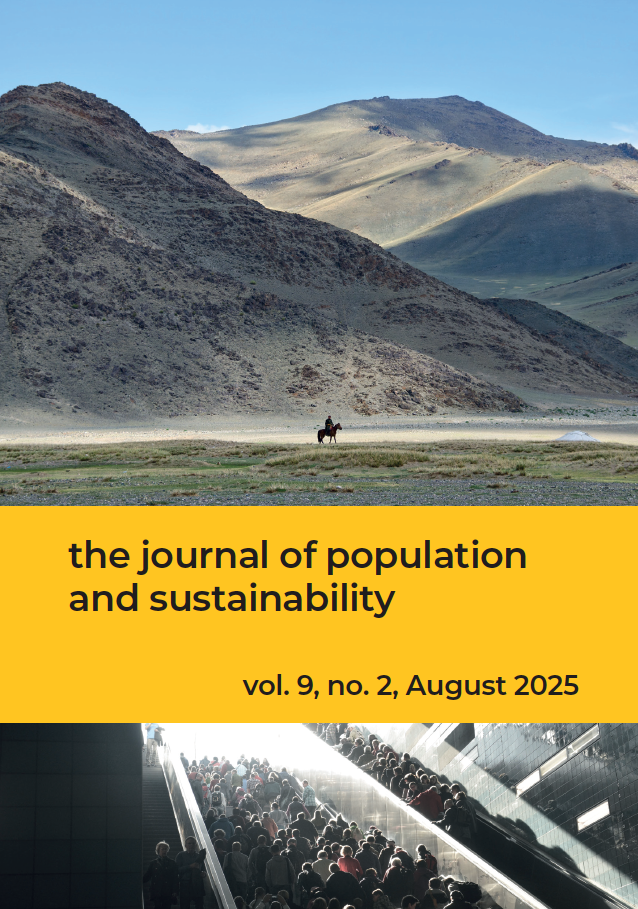Book Reviews
Published 2025-08-29
How to Cite
Samways, David. 2025. “Environmental Ethics and Population Growth in the Work of Robin Attfield”. The Journal of Population and Sustainability 9 (2):185-93. https://doi.org/10.3197/whpjps.63887831800449.
Copyright (c) 2025 David Samways

This work is licensed under a Creative Commons Attribution 4.0 International License.
Downloads
Download data is not yet available.
References
- Alcock, I., M.P. White, T. Taylor, D.F. Coldwell, M.O. Gribble, K.L. Evans, K.L., A. Corner, S. Vardoulakis and L.E. Fleming. 2017. ‘“Green” on the ground but not in the air: Pro-environmental attitudes are related to household behaviours but not discretionary air travel’. Global Environmental Change 42: 136–47. https://doi.org/10.1016/j.gloenvcha.2016.11.005
- Attfield, R. 1983. The Ethics of Environmental Concern. Oxford: Blackwell.
- Attfield, R. 2015. Ethics of the Global Environment. Second edition. Edinburgh: Edinburgh University Press.
- Attfield, R. 2024. The Ethics of the Climate Crisis. Cambridge: Polity.
- Bradshaw, C.J.A. and B.W. Brook. 2014. ‘Human population reduction is not a quick fix for environmental problems’. Proceedings of the National Academy of Sciences 111 (46): 16610–15. https://doi.org/10.1073/pnas.1410465111
- Broomell, S.B., D.V. Budescu and H.-H. Por. 2015. ‘Personal experience with climate change predicts intentions to act’. Global Environmental Change 32: 67–73. https://doi.org/10.1016/j.gloenvcha.2015.03.001
- Chaurasia, A. 2020. ‘Population effects of increase in world energy use and CO2 emissions: 1990–2019’. The Journal of Population and Sustainability 5 (1). https://doi.org/10.3197/jps.2020.5.1.87
- Colombo, S.L., S.G. Chiarella, C. Lefrançois, J. Fradin, A. Raffone and L. Simione. 2023. ‘Why knowing about climate change is not enough to change: A perspective paper on the factors explaining the environmental knowledge-action gap’. Sustainability 15 (20): 14859. https://doi.org/10.3390/su152014859
- Compassion in World Farming. n.d. ‘Factory farming map’: https://www.ciwf.org.uk/our-campaigns/factory-farming-map/ (accessed 28 May 2025).
- Coole, D.H. 2018. Should We Control World Population? Cambridge: Polity Press.
- Demski, C., S. Capstick, N. Pidgeon, R.G. Sposato and A. Spence. 2017. ‘Experience of extreme weather affects climate change mitigation and adaptation responses’. Climatic Change 140 (2): 149–64. https://doi.org/10.1007/s10584-016-1837-4
- Fisher, S., R. Fitzgerald and W. Poortinga. 2018 ‘Climate change: social divisions in beliefs and behaviour’. In J. Curtice, J. Perry, D. Phillips and M. Phillips (eds), British Social Attitudes: The 35th Report, pp. 1–26. London: The National Centre for Social Research.
- Graham, H., J.M. Bland, R. Cookson, M. Kanaan and P.C.L. White. 2017. ‘Do people favour policies that protect future generations? Evidence from a British survey of adults’. Journal of Social Policy 46 (3): 423–45. https://doi.org/10.1017/S0047279416000945
- Kahn, M.E. and M.J. Kotchen. 2011. ‘Business cycle effects on concern about climate change: the chilling effect of recession’. Climate Change Economics 02 (03): 257–73. https://doi.org/10.1142/S2010007811000292
- O’Neill, D.W., A.L. Fanning, W.F. Lamb and J.K. Steinberger. 2018. ‘A good life for all within planetary boundaries’. Nature Sustainability 1 (2): 88–95. https://doi.org/10.1038/s41893-018-0021-4
- O’Sullivan, J.N. 2023. ‘Demographic delusions: World population growth is exceeding most projections and jeopardising scenarios for sustainable futures’. World 4 (3): 545–68. https://doi.org/10.3390/world4030034
- Ritchie, H., P. Rosado and M. Roser. 2019. ‘Meat and dairy production’. Our World in Data: https://ourworldindata.org/meat-production (accessed 19 June 2025).
- Rosling, H., O. Rosling and A.R. Rönnlund. 2019. Factfulness: Ten Reasons We’re Wrong About the World – and Why Things are Better Than You Think. London: SCEPTRE.
- Samways, D. 2022. ‘Population and sustainability: Reviewing the relationship between population growth and environmental change’. The Journal of Population and Sustainability 6 (1): 15–41. https://doi.org/10.3197/JPS.63772239426891
- Samways, D. 2023. ‘Anthropocentrism, ecocentrism and hunter-gatherer societies: A strong structurationist approach to values and environmental change’. Environmental Values 32 (2): 131–50. https://doi.org/10.3197/096327122X16491521047062
- Samways, D. 2025. ‘The anthropocentrism thesis: (mis)interpreting environmental values in small-scale societies’. Environmental Values 34 (1): 25–42. https://doi.org/10.1177/09632719241245170
- Scruggs, L. and S. Benegal. 2012. ‘Declining public concern about climate change: Can we blame the great recession?’ Global Environmental Change 22 (2): 505–15. https://doi.org/10.1016/j.gloenvcha.2012.01.002
- Spence, A., W. Poortinga, C. Butler and N.F. Pidgeon. 2011. ‘Perceptions of climate change and willingness to save energy related to flood experience’. Nature Climate Change 1 (1): 46–49. https://doi.org/10.1038/nclimate1059
- United Nations. 2024. World Population Prospects 2024: Summary of Results. New York: UN Department of Economic and Social Affairs.
- Vieira, J., S.L. Castro and A.S. Souza. 2023. ‘Psychological barriers moderate the attitude-behavior gap for climate change’. PLOS ONE 18 (7): e0287404. https://doi.org/10.1371/journal.pone.0287404





